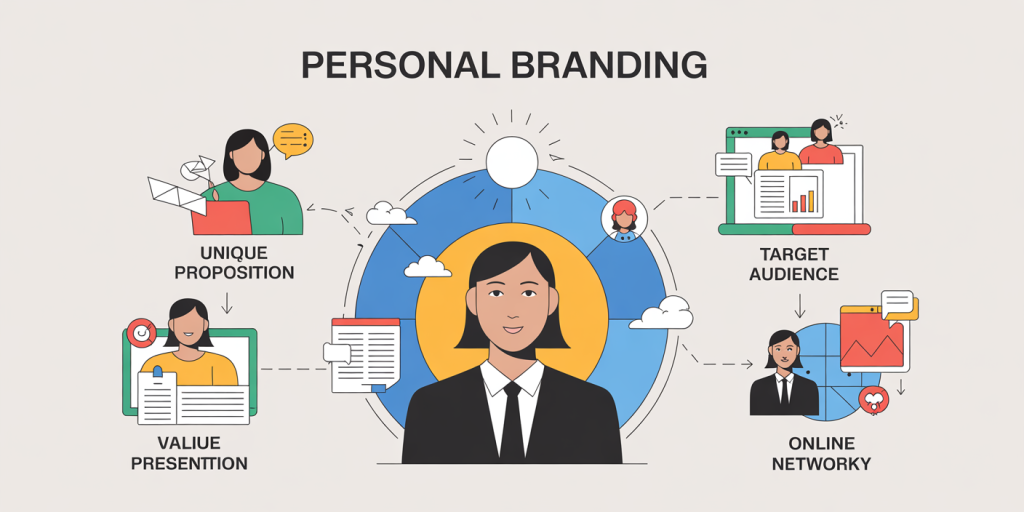What Is Personal Branding and How It Can Transform Your Career
In today’s competitive professional landscape, differentiating oneself has become more critical than ever. Whether you are climbing the corporate ladder, transitioning careers, or building a freelance enterprise, how you present yourself to the world can make or break your success. This concept, known as personal branding, has gained significant traction as a strategic tool for career advancement. By consciously crafting and managing your image, skills, and reputation, personal branding plays a pivotal role in opening doors to opportunities that might otherwise remain inaccessible.
Personal branding is not just about self-promotion; it encompasses authenticity, clarity, and a consistent message that resonates with your target audience. With digital platforms flooding the market, the ability to control your narrative and influence perceptions has become feasible for professionals at every level. In fact, according to a survey by CareerBuilder, 70% of employers use social media to screen candidates during the hiring process, emphasizing the importance of a strong digital presence. This article explores what personal branding is, its essential components, practical examples, benefits, and how it can transform your career trajectory.
Defining Personal Branding: More Than Just a Logo or Resume
At its core, personal branding is the strategic process of creating a recognizable professional identity. Unlike corporate branding that represents companies, personal branding focuses on the individual’s skills, personality, values, and reputation. The goal is to highlight what makes someone unique and valuable within their industry or profession. Jeff Bezos, the founder of Amazon, once said, “Your brand is what other people say about you when you’re not in the room.” This quote perfectly encapsulates the essence of personal branding.
Successful personal branding relies heavily on authenticity and consistency. Authenticity ensures that the brand truly reflects the individual’s core values and strengths, building credibility and trust. Consistency across channels—whether LinkedIn profiles, personal websites, or public speaking engagements—reinforces the message and increases memorability. Personal branding also includes soft elements such as communication style, ethical standards, and professional demeanor, all shaping how others perceive an individual beyond mere skills or credentials.
Anúncios
To illustrate, consider Oprah Winfrey’s personal brand: a powerful blend of empathy, media expertise, and resilience. She consistently communicates these traits across television, social media, and philanthropy, creating an indelible impression that supports her career growth and influence. On a smaller scale, a software developer might brand themselves as a reliable expert in cybersecurity, maintaining an informative blog, engaging in relevant online communities, and delivering talks at conferences.
Key Elements of Building a Personal Brand
Creating a compelling personal brand involves multiple components that work together harmoniously. The first step is identifying your unique value proposition—what makes you stand out. This ranges from specialized skills, experiences, or perspectives that competitors or colleagues do not offer. A clear understanding of your audience is equally essential; who are you trying to influence or connect with? Tailoring your messaging to meet the needs and expectations of that group increases the brand’s impact.
Another critical factor is establishing a strong online presence. According to a 2023 LinkedIn survey, individuals with complete LinkedIn profiles are 40% more likely to receive job opportunities. This makes platforms like LinkedIn, Twitter, or personal websites vital real estate for showcasing your expertise, achievements, and professional personality. Creating content such as articles, videos, or podcasts related to your field not only demonstrates authority but also nurtures engagement and expands your network.
Networking, both online and offline, also plays a crucial role in shaping your personal brand. Engaging with colleagues, mentors, industry leaders, and clients helps build relationships that may lead to collaborations or referrals. Remember, your reputation spreads through word of mouth; how you interact and contribute reflects directly on your brand’s image.
| Key Elements | Description | Example |
|---|---|---|
| Unique Value | Individual strengths, skills, and qualities | A marketing expert specializing in digital analytics |
| Target Audience | Specific group you want to influence | Hiring managers in tech startups |
| Online Presence | LinkedIn, personal website, social media, content creation | Regular blog posts on industry trends |
| Networking | Professional relationships and community interaction | Attending industry conferences and webinars |
| Consistency & Authenticity | Alignment of personal and professional image across platforms | Same professional photo, tone, and message everywhere |
Practical Examples of Personal Branding Impact
Anúncios


The transformative effects of personal branding extend across industries and career stages. One famous case is Elon Musk, whose personal brand as an innovative, risk-taking entrepreneur has impacted the success of Tesla, SpaceX, and other ventures. Media coverage, his social media engagement, and consistent messaging around futuristic technologies amplify his brand, helping to attract investors, talent, and customers.
On a smaller scale, consider Jane Smith (a pseudonym), a mid-career graphic designer who struggled to find clients despite her strong portfolio. By developing a personal brand focused on minimalist and clean design for tech startups, she started posting targeted content on Instagram, launched a website with client testimonials, and regularly participated in LinkedIn groups. Within six months, her client base doubled, and she secured contracts with several high-profile startups.
A comparison of career progress between individuals with and without deliberate personal branding efforts further underscores its importance:
| Career Aspect | Without Personal Branding | With Personal Branding |
|---|---|---|
| Visibility | Limited to immediate professional circle | Broader recognition via social media and networking |
| Opportunity Access | Dependent on chance connections | Proactively attracts recruiters and clients |
| Career Advancement | Slower, less predictable | Faster promotions and varied project offers |
| Salary Negotiation | Often less leverage | Higher bargaining power due to reputation |
| Job Security & Resilience | Vulnerable to market changes | Stronger position due to trusted expertise |
This table illustrates how personal branding can accelerate career paths and provide a competitive edge in an increasingly digital world.
Benefits of Personal Branding in Career Growth
Personal branding yields multiple tangible and intangible benefits that collectively enhance professional growth. Among the most notable is increased credibility. When you develop a clear, authoritative personal brand, others perceive you as trustworthy and competent, which can result in invitations to speak at events, media features, and industry awards.
Moreover, personal branding cultivates trust and emotional connection with your audience. This is especially crucial for freelancers and entrepreneurs who rely heavily on client trust and referrals. According to a Edelman Trust Barometer report, 81% of consumers say trust in a brand is a deal-breaker or deciding factor in their purchase decisions, highlighting how vital consistent and honest branding is.
Career diversification is another significant advantage. A strong brand opens doors beyond your immediate role, allowing smoother transitions across related fields or industries. For example, a financial analyst with a personal brand focused on fintech innovation may more easily pivot to advisory roles, product development, or consulting.
Personal branding also empowers you to control the narrative about your professional identity. Instead of employers or colleagues defining your reputation, you shape perceptions proactively, which protects your interests during organizational changes or disputes.
Crafting Your Brand: Actionable Strategies
Effective personal branding requires deliberate planning and ongoing effort. Begin by conducting a personal SWOT analysis (Strengths, Weaknesses, Opportunities, Threats) to identify your core attributes and areas for improvement. Ask for feedback from peers and mentors to gain an external perspective on your image.
Next, define your brand message succinctly. What do you want others to remember about you? Develop an elevator pitch that integrates your skills, values, and aspirations. This clarity ensures every piece of communication reinforces your brand identity.
Building and curating your digital footprint is vital. Optimize your LinkedIn profile with a professional photo, keyword-rich summary, and detailed achievements. Start sharing articles or creating original content aligned with your expertise. For creatives, platforms like Behance or Dribbble serve as digital portfolios, while professionals in other realms might consider podcasts or webinars.
Consistency across platforms and interactions builds trust. Use the same name, photo, and tone on social media and professional sites. Engage regularly with your audience to remain top-of-mind without overwhelming them.
Accountability is essential in personal branding. Track growth using metrics such as follower count, engagement levels, or the number of inquiries received through your online profiles. Adjust strategies based on data to refine your brand over time.
Future Perspectives: The Evolution of Personal Branding
The future of personal branding is closely intertwined with technological advances and shifting workplace dynamics. Artificial intelligence, virtual reality, and augmented reality are beginning to revolutionize how individuals communicate their value. AI-powered tools can help craft personalized content, analyze engagement, and suggest optimization, making brand management more effective and accessible.

Furthermore, the rise of the gig economy and remote work models amplifies the need for a distinct personal brand. With fewer face-to-face networking opportunities, professionals will increasingly rely on digital personas to establish trust and attract opportunities globally.
Cultural trends toward transparency and social responsibility will also shape personal branding strategies. Professionals who demonstrate ethical conduct, inclusivity, and social consciousness are poised to resonate better with contemporary audiences and organizations.
In the years ahead, personal branding will evolve from a “nice-to-have” to a fundamental career skill. Educational institutions may integrate brand-building into curricula, while organizations might seek candidates with well-developed personal brands as indicators of initiative, creativity, and communication skills.
Investing in your personal brand today is not merely a career enhancer; it is a preparation for a professional environment that values individuality, authenticity, and digital savvy more than ever before.
